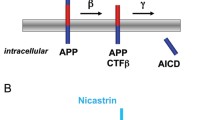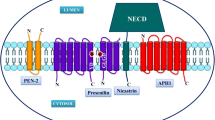Abstract.
Presenilin-1 (PS1) mutations account for the greatest portion of early onset familial Alzheimer's disease (FAD) cases. The exact cellular function of PS1 is not known. To date, PS1 mutations have been shown to alter two potential biological roles of the protein, either of which could make neurons more susceptible to neurodegeneration. First, PS1 mutations result in elevated Aβ42/Aβ40 ratios in plasma of FAD patients, in transgenic mice and in transfected cell lines. Aβ42 is the more hydrophobic and most neurotoxic form of the peptide. A common molecular event that has been associated with all of the known early onset FAD genes is the excessive production or accumulation of the Aβ peptide in the brain. PS1 mutations have also been found to alter the Notch signalling pathway, but the mechanism by which this may affect neurodegeneration remains to be determined. Future studies will be needed to elucidate whether PS1 mutations lead directly to neuronal dysfunction and degeneration or cause cell death by increasing Aβ42 generation and deposition.
Similar content being viewed by others
Author information
Authors and Affiliations
Rights and permissions
About this article
Cite this article
Kovacs, D., Tanzi, R. Monogenic determinants of familial Alzheimer's disease: presenilin-1 mutations. CMLS, Cell. Mol. Life Sci. 54, 902–909 (1998). https://doi.org/10.1007/s000180050219
Published:
Issue Date:
DOI: https://doi.org/10.1007/s000180050219




